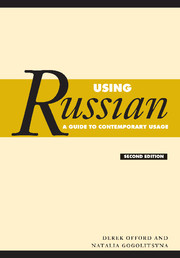Book contents
- Frontmatter
- Contents
- Preface to the first edition
- Preface to the second edition
- Acknowledgements
- Sources
- Note on transcription, stress marks and transliteration
- Glossary of linguistic terms
- List of abbreviations
- 1 Varieties of language and register
- 2 Passages illustrating register
- 3 Problems of meaning: Russian words
- 4 Problems of translation from English into Russian
- 5 Vocabulary and idiom
- 6 Language and everyday life
- 7 Verbal etiquette
- 8 Word-formation
- 9 Inflection
- 10 Prepositions
- 11 Syntax
- 12 Stress
- Index of Russian words, phrases and affixes
- General index
5 - Vocabulary and idiom
Published online by Cambridge University Press: 05 June 2012
- Frontmatter
- Contents
- Preface to the first edition
- Preface to the second edition
- Acknowledgements
- Sources
- Note on transcription, stress marks and transliteration
- Glossary of linguistic terms
- List of abbreviations
- 1 Varieties of language and register
- 2 Passages illustrating register
- 3 Problems of meaning: Russian words
- 4 Problems of translation from English into Russian
- 5 Vocabulary and idiom
- 6 Language and everyday life
- 7 Verbal etiquette
- 8 Word-formation
- 9 Inflection
- 10 Prepositions
- 11 Syntax
- 12 Stress
- Index of Russian words, phrases and affixes
- General index
Summary
Neologisms
The radical changes in Russian life since the mid-1980s, the sudden greatly increased exposure to Western influence, and the introduction of large numbers of new institutions, habits and concepts have led to the flooding of the Russian language with neologisms. These neologisms relate to almost every area of life, but are especially numerous in such fields as politics, economics, social problems, law and order, science and technology, education, culture, sport and fashion.
Many of the neologisms are loanwords from other languages, nowadays mainly from English. Neologisms of this type may require slight phonetic adaptation, especially when the English word contains the letter c followed by e or i, e.g. геноцйд, genocide. The majority of them are absorbed into Russian without morphological adaptation, if they are nouns (e.g. брйфинг, briefing), although some (especially those ending in -и) will be indeclinable (e.g. паблйсити (n) publicity). However, the adjectives and verbs among loanwords, and also many borrowed nouns, require the addition of Russian affixes to the foreign root (e.g. вертикáльный, top-down (of management); митинговáть, to take part in meetings (R1, pej); са̀мофинансийрование, self-financing).
Many other neologisms are derived from existing Russian resources by various means, including composition of acronyms (e.g. бомж, vagrant), affixation (e.g. теневйк, person who operates in the shadow economy) and polysemanticisation (e.g. отмывáть/отмíть, to launder (money)), perhaps on the basis of some foreign model (e.g. я́стреб, hawk, used in a figurative sense).
- Type
- Chapter
- Information
- Using RussianA Guide to Contemporary Usage, pp. 163 - 202Publisher: Cambridge University PressPrint publication year: 2005



